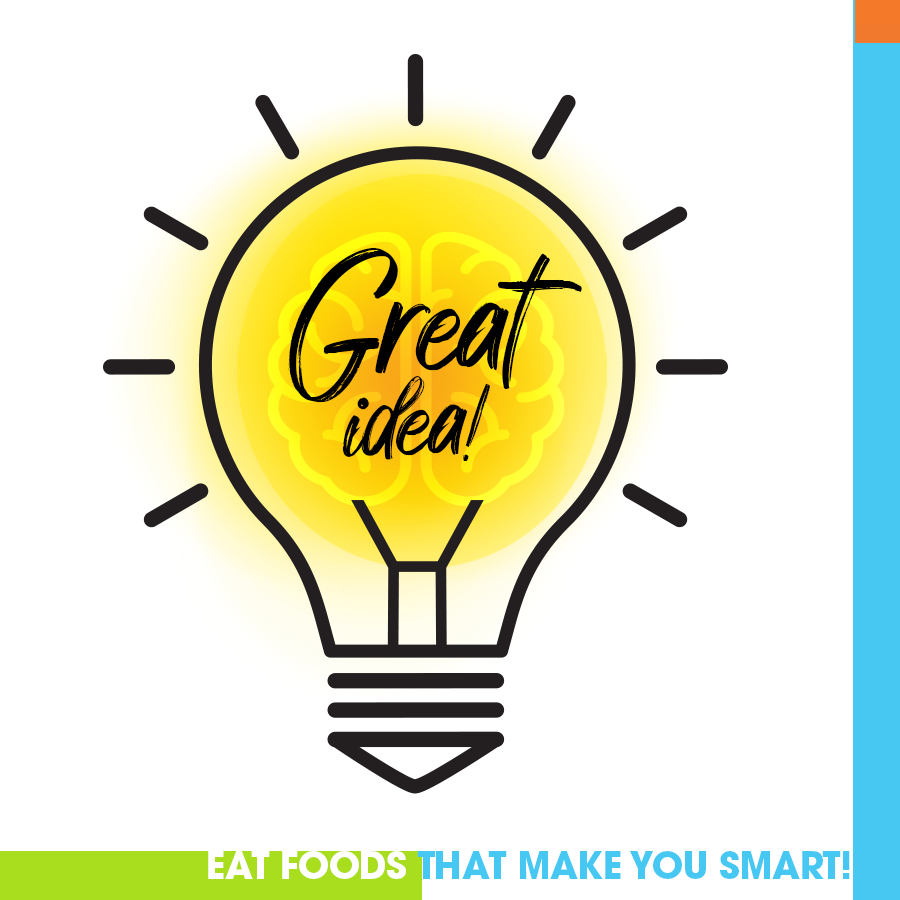Your brain handles a lot. It sends instructions to move muscles, makes sure organs are working, remembers information, has creative ideas, and powers every system in your body. We often eat foods that help strengthen our muscles or give us more energy—but brains need nutrition too!
There are a wide variety of foods that can help you concentrate in your day-to-day routine. Many of the nutrients and foods that help your brain, also protect your heart and blood vessels. That means when you eat healthy foods you are giving your brain a boost and will be on your way to full-body health!
Be on the lookout for foods that include brain-healthy nutrients like:
- vitamin B
- vitamin K
- vitamin E
- coenzyme Q10
- Lutein
- Folate
- beta carotene
- omega-3
Green, Leafy Vegetables
You’ve heard how important vegetables are for your health—because it’s true! When it comes to brain health, green, leafy vegetables can boost cognitive function and slow age-related cognitive decline. Translation: leafy green vegetables can help clear your mind and keep your brain healthy as you age! When planning your meals, include at least one serving of greens per day.
Leafy vegetables that boost brain health include:
- Kale
- Spinach
- Collards
- Broccoli
- Romaine lettuce
Healthy Fats
Not all fats are bad! Healthy fats are important for both your heart and your brain. When you’re looking at fat content in food, you want to see ‘unsaturated fats’—or monounsaturated and polyunsaturated fats. Healthy fats have many benefits. They give long-term energy to the brain. This helps you concentrate longer while increasing your memory!
Find healthy fats in:
- Olive, Peanut, and Canola Oils
- Avocados
- Almonds
- Hazelnuts
- Pecans
- Seeds
- Fish
Berries
Research suggests that eating berries can have positive effects on the brain and can help prevent memory loss with their ability to reduce brain inflammation. Not to mention they are delicious!
Some of the berries that are the best for brain health include:
- Blueberries
- Blackberries
- Strawberries
Fish
A protein source linked to a great brain boost is fish—rich in omega-3 fatty acids that are key for brain health. They have the ability to combat damaging beta-amyloid blood levels that are associated with Alzheimer’s disease. The omega-3s found in fish play a vital role in enhancing your memory. Try to include fish in your diet at least twice a week.
Choose these fish varieties that are low in mercury:
- Salmon
- Cod
- Canned light tuna
- Pollack
- Walleye
- Perch
- Bass
Nuts and Chocolate
Nuts—particularly walnuts—and seeds are good sources of the antioxidant vitamin E, which is linked to less cognitive decline as you age. Dark chocolate also has other powerful antioxidant properties. It contains natural stimulants like caffeine, which can enhance focus. Enjoy up to an ounce of nuts and dark chocolate a day for the benefits you need without excess calories, fat, or sugar.
Some of the best nuts for your brain are:
- Walnuts
- Pecans
- Cashews
- Almonds
- Flax Seeds
- Pumpkin Seeds
- Sunflower Seeds
Caffeine
There’s no magic bullet to boost IQ or make you smarter—but certain substances, like caffeine, can energize you and help you concentrate. Commonly found in coffee and chocolate caffeine gives you that unmistakable wake-up buzz, though the effects are short-term. As if you needed another excuse to eat chocolate, dark chocolate has powerful antioxidant properties, and it contains natural stimulants like caffeine, which can enhance focus.
CAUTION: Be careful with caffeine. Too much caffeine can make you jittery and uncomfortable. Energy drinks have become popular but can also have yucky withdrawal effects such as mood swings and headaches. Caffeine intake—especially for children and teens– should be limited because it can lead to higher blood pressure, sleep deprivation, and can make anxiety worse.
Healthier caffeinated food and drinks can include:
- Coffee
- Black Tea
- Green Tea
- Dark Chocolate
Fiber
Every organ in the body depends on blood flow, especially the heart and brain. A diet high in fiber can cut the risk of heart disease and lower bad cholesterol. This reduces your risk of plaque buildup and enhances blood flow, offering a simple, tasty way to fire up brain cells.
Foods that contain high fiber include:
- Beans
- Whole Wheat
- Oats
- Rye
- Buckwheat
- Quinoa
- Brown Rice
- Popcorn
- Chia Seeds
- Avocado
- Cherries
- Grapes
- Dates
- Cabbage
- Broccoli
- Spinach
- Eggplant
Don’t Forget to Start Each Day with Breakfast
Tempted to skip breakfast? Studies have found that eating breakfast may improve short-term memory and attention. Students who eat breakfast tend to perform better than those who don’t. Foods at the top of the brain-fuel list include high-fiber whole grains, dairy, and fruits.
Be careful not to overeat; research has found that high-calorie breakfasts can hinder concentration. That means take it easy on heavy carbohydrate breakfast foods like pancakes and waffles drenched in syrup. Instead, balance with higher protein options like eggs.
Bottom line: If your diet lacks essential nutrients, it can hurt your ability to concentrate. Eating too much or too little can also interfere with your focus. A heavy meal may make you feel tired, while too few calories can result in distracting hunger pangs. Strive for a well-balanced diet full of a wide variety of healthy foods like fruits, vegetables, legumes, whole grains, and protein.
Sources: Harvard.edu, CDC, CDC

